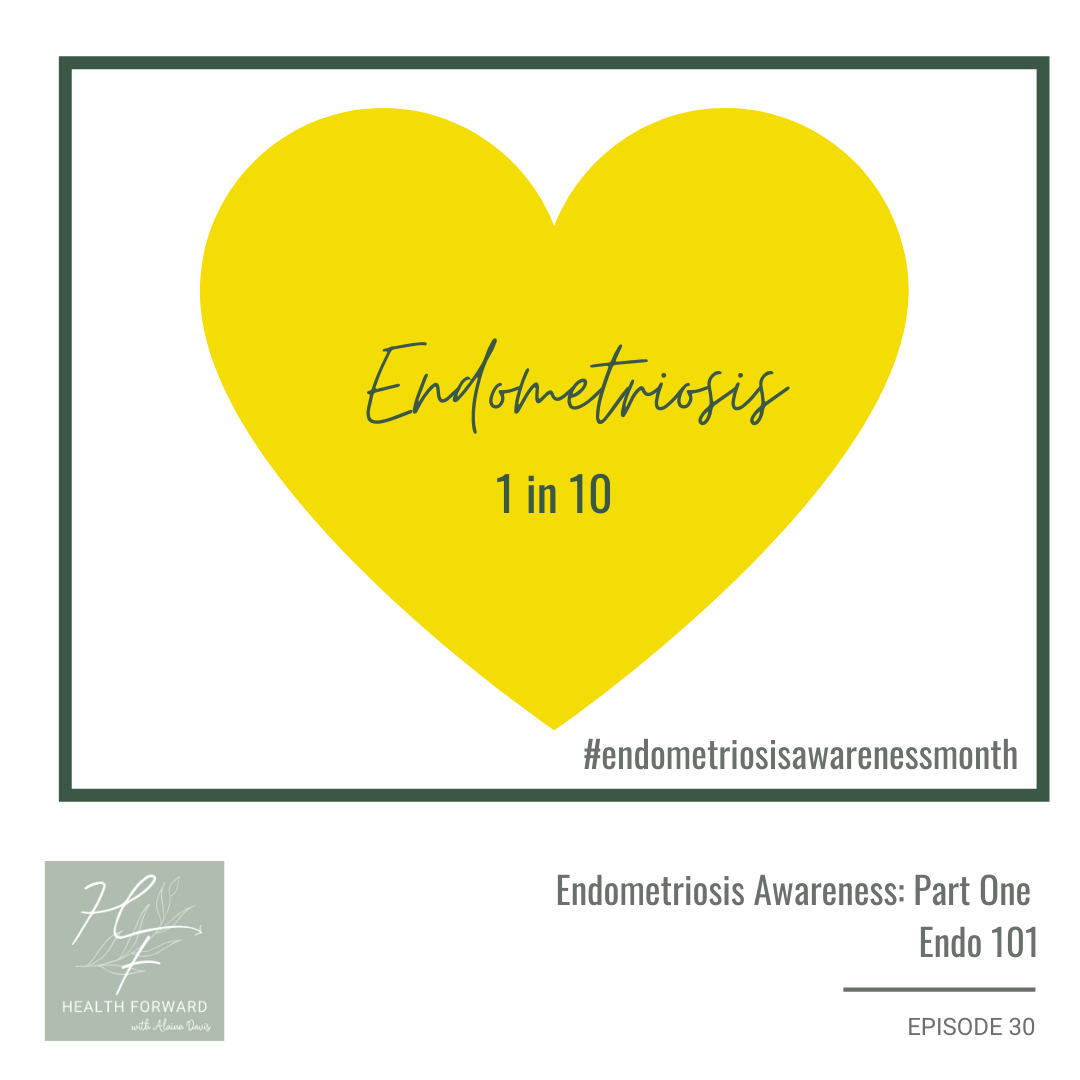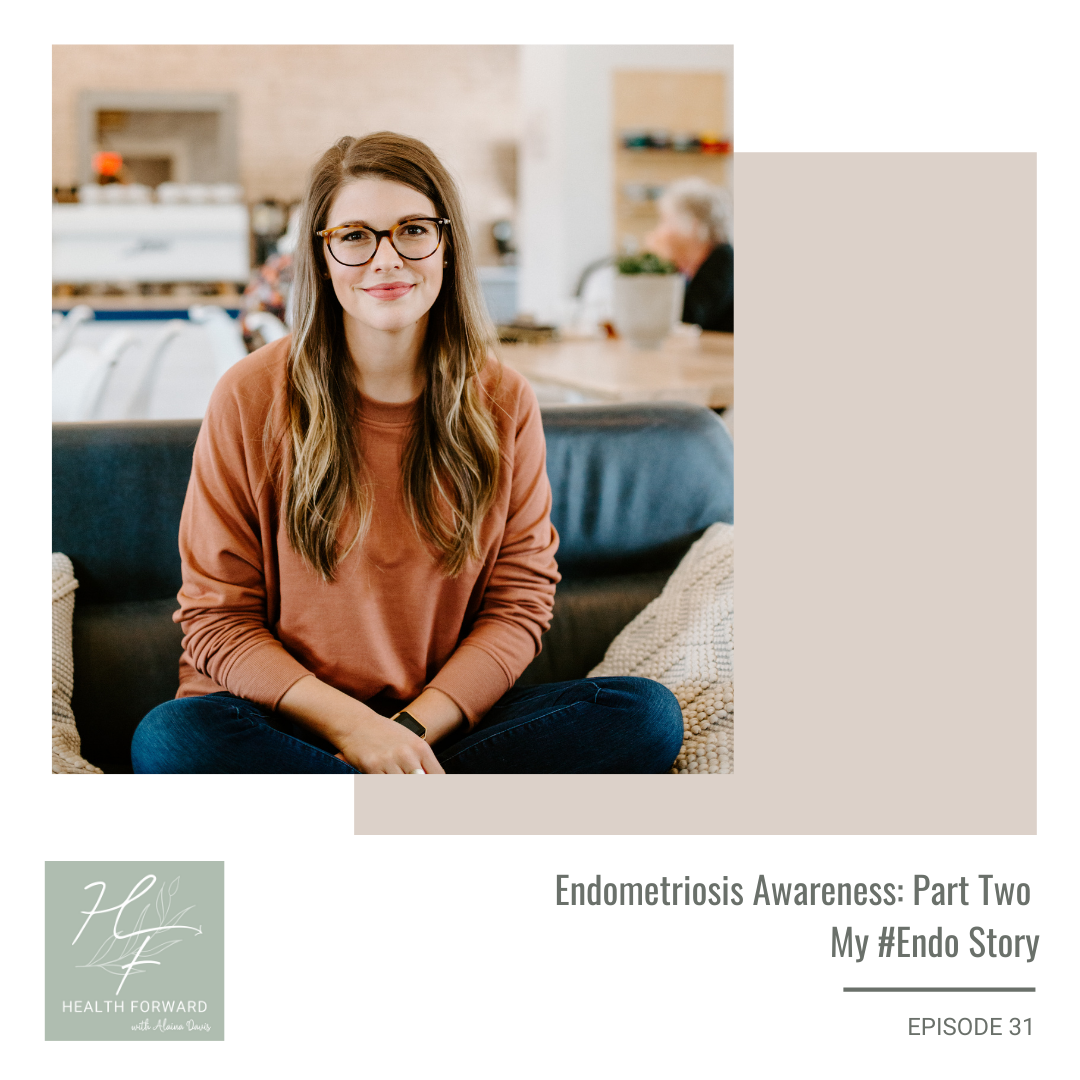5 Tips for Managing Endometriosis
Endometriosis is an inflammatory hormonal condition in which tissue similar to the lining of the uterus (endometrium) is found in other parts of the body outside of the uterus. This tissue responds to hormonal shifts of the menstrual cycle (just the same as the tissue within the uterus) and as such causes inflammation, pain, and often scar tissue/adhesions. It is estimated that about 200 million women worldwide have endometriosis. It is a complex disorder, and because of the wide variety of symptoms that can be associated with it, it can often take several years and multiple providers to actually receive an endometriosis diagnosis.
If you want to know more about Endo including the symptoms, what we know (and don’t) about possible causes, and current treatment options, I recorded a podcast all about that last year - it is episode 30. I also have a few other endo-related episodes including more of my personal journey with it, as well as an episode all about acupuncture and helpful it can be for managing endo.
This leads me to the topic for today - 5 Tips for Managing Endometriosis. Whether you have already received an endo diagnosis or maybe just suspect that you have it, there are some things that you need to know that can help you along your journey.
Be an advocate for your health
Unfortunately, it can take multiple years, sometimes even a decade, and multiple doctors and providers to get a receive an Endo diagnosis. Sadly a lot of endo symptoms are often overlooked, downplayed, or even dismissed and labeled as just being tired, overwhelmed, or dramatic. Hopefully, this will not be your experience but know going in that you are going to need to be your own health advocate. Even with the most skilled and compassionate providers, no one knows your body or your symptoms the way that you do.
Make a list of questions before each appointment and be willing to voice your concerns if you aren’t comfortable with a particular treatment plan.
Remember that your provider is there to help you but they can’t read your mind - so you have to speak up, and they don’t have the final say about your care. If you feel uncomfortable or dismissed, find another provider.
When it comes to symptoms, deal with the root cause
There is not yet an agreed-upon root cause of Endo. There are several theories that are being researched but as of now, that is all that they are. What we do know is that women with endometriosis often also have poor gut health, stagnation within both the circulatory and lymphatic systems, and hormonal imbalances as well as chronic inflammation. So while we don’t know what thing/things triggered the condition, we can address these other issues.
Working on gut health by addressing leaky gut or any gut lining issues, as well as ensuring a good balance of gut flora, can be a great place to start as all other processes and systems of the body are affected by our microbiome.
Acupuncture can also be a great starting place as it can benefit stagnation, hormone imbalances, and inflammation.
Create a support system
A condition like Endometriosis affects your entire life, not just part of it, so you will likely need to address each area with multiple providers. Creating a care team may involve many different types of providers including a surgeon (this will often be someone like a Reproductive Endocrinologist that is specifically trained in excision surgery for Endo), acupuncturist, pelvic health physical therapist, health coach, or a nutritionist trained in hormone health, and often a mental health professional or licensed therapist. Your care team may have more or fewer providers, but it’s important to remember that this is a complex condition, so it’s good to support yourself in all of these different areas - it doesn’t make you extra.
In addition, to have different trained providers, it’s also important to surround yourself with friends and family that can support you along your journey. Endometriosis can be a lonely diagnosis because it’s still such a hush-hush topic. Some still think of it as a period problem when in reality it is so much more. When trying to manage a chronic condition of any kind, you will need an outlet. A small group of people that you can share your worries, struggles, and feelings with.
Design a plan that works for you
Similar to the last tip, you need to create a plan to deal with your specific symptoms that is helpful for you. Although there are many shared symptoms among those with Endo, every case is unique and individualized. No two women are exactly the same - they have different genetic makeups, different environmental factors, different lifestyles. So what may help one person may not be the golden ticket for another.
Pay attention to the signals (symptoms) that your body is giving you and do some research into what may help that also work with your phase of life, schedule, etc. For example, if you deal with chronic fatigue, waking up at 5 am and working out first thing in the morning may not be a good idea for you, even if it seems to be working just fine for your friend. We can always learn from other people, but be careful when comparing your journey with someone else.
Be gracious with yourself
As I mentioned before, apart from divine healing, there is currently no “cure” for Endo. However, that doesn’t mean that there can’t be relief or a reversal of symptoms, maybe even a state of remission, but it’s not something that is “cured” and you never have to think about it again.
So make sure to set realistic expectations for yourself when making changes to your lifestyle. Remember that healing isn’t linear. This is a common frustration for those with any chronic condition. Healing is a process of ups and downs. Doing really well for a while, having a setback, learning how things affect your body, adjusting, and on and on it goes. Try to remember this when you start to feel frustrated with your body.
Another common thought that those dealing with chronic pain or a condition can be the feeling that their body is betraying them. I just want to encourage you to really work on your mindset around this. You are not defective. Your body isn’t betraying you. You were fearfully and wonderfully made - just like everyone else. We just live in a fallen world where pain and disease still exist, and your body needs some extra support. Your journey isn’t going to be like someone else’s and that is a good thing! It’s uniquely yours. Be gracious with yourself and find gratitude in the ways that your body serves you every day.
I hope that this has helped to encourage you. If you know someone who has endometriosis, check on them and see how they’re doing. Send them this podcast - odds are that they probably need some encouragement too!




